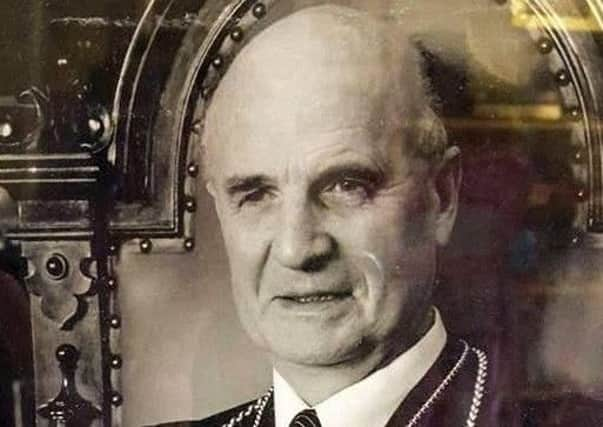Obituary: James McKinley, Dumbarton provost, marine engineer, monk


James McKinley, the son of a lowly Irish immigrant lamplighter who embraced a career in shipbuilding, the railways, the Catholic Church and politics and became provost of Dumbarton, has died in Glasgow, aged 90.
Mr McKinley resigned from the provostship of Dumbarton District Council in 1984 during a turbulent time for the Labour group when he handed in his gold chain of office.
Advertisement
Hide AdAdvertisement
Hide AdThe Labour Party, who formed the administration, had split over a bitter dispute involving breaches of the site licence for the Peace Camp outside the Clyde Naval Base at Faslane on the Gareloch.
Provost McKinley said the peace activists should be pursued through the courts, but others disagreed and he quit to stand as an Independent.
He had been involved in an earlier dispute with left-wing members of the party over an increase in council house rents which he supported and on which he stood his ground.
He was de-selected from the candidacy for the safe Labour Dumbarton West seat and shifted to Dumbarton Central, which was held by the SDP who went on to retain it in the election of May 1984.
Jimmy McKinley was a dour and determined old school Labour politician with a strong Catholic faith, both of which he wore on his sleeve.
He was born at 19 Levenford Place overlooking the River Leven in Dumbarton to John and Grace McKinley (nee Callaghan). One of six surviving children, two sisters and three brothers, he also had a one step-brother as his mother remarried James Friel in 1941 after John’s death.
Jimmy’s birth certificate gave his father’s occupation as “corporation lamplighter,” and he was proud of that.
He was also proud of the fact that his parents, John McKinley and Grace Callaghan, had married 100 years ago on November, 1916, in Kindrum, County Donegal, Ireland.
Advertisement
Hide AdAdvertisement
Hide AdJimmy was a pupil at St Patrick’s High School in Dumbarton for nine years until 1940. His first job, whilst still at school, was on a milk round and then, on leaving school, he went to work at the famous Denny’s Leven shipyard in Dumbarton, where he completed his apprenticeship as a marine engineer.
Like so many of his generation at that time, Jimmy was much involved in the Catholic Church where the parish priest was the redoubtable Monsignor Hugh Canon Kelly, who encouraged his young parishioners to take up the religious life.
Following his apprenticeship, Jimmy tested his vocation to the priesthood, firstly with the Cistercian monks, also known as Trappists, at the abbey of Mount Melleray in County Waterford, Ireland. He transferred from there to the Servite Order in Oxford, England, where he was known as Brother Gabriel.
Although he discerned that the priesthood was not his vocation, his connection to both these institutions remained important throughout his life.
After his return from Oxford, Jimmy spent the rest of his working life employed by British Rail working in many capacities from Station Master to finance executive, and retaining a lifelong interest in rail travel.
During his working life, he also took many correspondence courses, including a three-year sabbatical to become a mature student at Strathclyde University, achieving an economics degree in 1972.
He was first elected to Dumbarton Town Council in 1960. He was a bailie, the treasurer and then twice provost (1975-77 and 1980-84).
Dumbarton had one of the largest Irish immigrant populations in the middle of last century and a long history of division and sectarianism.
Advertisement
Hide AdAdvertisement
Hide AdJimmy McKinley was proud of the fact that he was the first Catholic Provost of the town since the Reformation and did a great deal to support Catholic schools, but also saw improving relationships between the different religious communities as a core issue.
Mr McKinley was a director of the Dumbarton Equitable Co-operative Society, which was a power in the land at that time with almost every family possessing a “store number,” to shop in departments that ranged from food to furniture, and was actively involved with the Dumbarton Old Folks Committee until his late seventies.
The town of Dumbarton remained central to his life even when he latterly moved to Glasgow, and his service as a councillor was an inspiration to his family and those who knew him.
That family was always at the centre of his life. On 4 August 1953, Jimmy married Dumbarton woman Bridget Glover (1926-2002) at St Patrick’s, Dumbarton. The service was celebrated by Father Richard O’Callaghan, with whom he and Bridget (Babs) were lifetime friends. His marriage to Bridget was the bedrock to his life and they had seven children – Ian, Marie, Kenneth (died at birth), Jim, Eileen, Pauline and Tony. Their five grandchildren – Jamie, Brian, Rebecca, Myriam, Judith – and two great-grandchildren – Ben and Alyssa – were Jimmy’s pride and joy. Although Bridget sadly died in 2002, they were able to enjoy many happy years of retirement together, travelling the world to visit their children in the various countries to which some of them had gone to live and work.
Five years ago, due to failing health, Jimmy moved to Glasgow, living first with his daughter Marie in Dennistoun, then moving into St Joseph’s Care Home in Robroyston where he received excellent care there from the Little Sisters of the Poor and their staff.
He died there peacefully 3 February 2016, two weeks after his 90th birthday celebrations. His funeral Mass will take place on Saturday, 13 February at St Joseph’s chapel in the home at Robroyston at 10am followed by burial in Dumbarton Cemetery at 12 noon.
Jimmy McKinley leaves an inspirational legacy of public service, rooted in a belief that community service is something everyone is called to.
His daughter, Marie Cooke, said: “Alongside other aspects of his life such as his love for his family, his faith, dedication to learning, belief in others, this legacy will shape our memory of my father.”